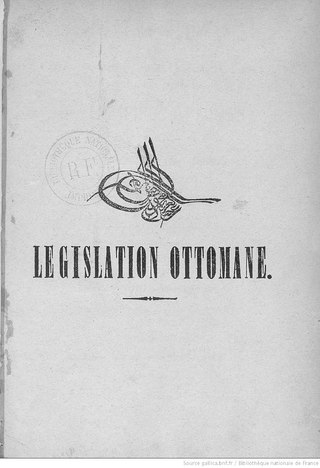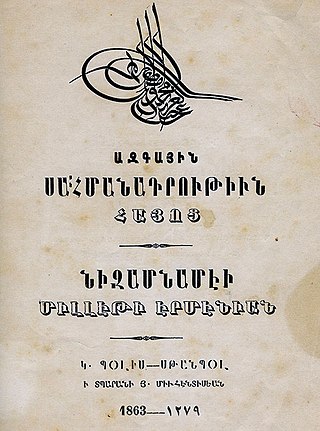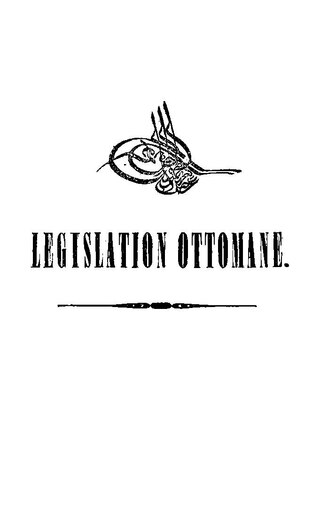Related Research Articles
Shari may refer to:
In the Ottoman Empire, a millet was an independent court of law pertaining to "personal law" under which a confessional community was allowed to rule itself under its own laws.

Hakham Bashi is the Turkish name for the Chief Rabbi of the nation's Jewish community. In the time of the Ottoman Empire it was also used for the chief rabbi of a particular region of the empire, such as Syria or Iraq, though the Hakham Bashi of Constantinople was considered overall head of the Jews of the Empire.

Ahmed Djemal, also known as Djemal Pasha, was an Ottoman military leader and one of the Three Pashas that ruled the Ottoman Empire during World War I.

The Imperial Reform Edict was a February 18, 1856 edict of the Ottoman government and part of the Tanzimat reforms. The decree from Ottoman Sultan Abdulmejid I promised equality in education, government appointments, and administration of justice to all regardless of creed. The decree is often seen as a result of the influence of France and Britain, which assisted the Ottoman Empire against the Russians during the Crimean War (1853–1856) and the Treaty of Paris (1856) which ended the war.
Cheri or Chéri may refer to:

Shaykh al-Islām was used in the classical era as an honorific title for outstanding scholars of the Islamic sciences. It first emerged in Khurasan towards the end of the 4th Islamic century. In the central and western lands of Islam, it was an informal title given to jurists whose fatwas were particularly influential, while in the east it came to be conferred by rulers to ulama who played various official roles but were not generally muftis. Sometimes, as in the case of Ibn Taymiyyah, the use of the title was subject to controversy. In the Ottoman Empire, starting from the early modern era, the title came to designate the chief mufti, who oversaw a hierarchy of state-appointed ulama. The Ottoman Sheikh al-Islam performed a number of functions, including advising the sultan on religious matters, legitimizing government policies, and appointing judges.

The Constitution of the Ottoman Empire was the first and only constitution of the Ottoman Empire. Written by members of the Young Ottomans, particularly Midhat Pasha, during the reign of Sultan Abdul Hamid II, the constitution was in effect from 1876 to 1878 in a period known as the First Constitutional Era, and from 1908 to 1922 in the Second Constitutional Era. After Abdul Hamid's political downfall in the 31 March Incident, the Constitution was amended to transfer more power from the sultan and the appointed Senate to the popularly-elected lower house: the Chamber of Deputies.

The Armenian National Constitution or Regulation of the Armenian Nation was the 1863 Ottoman Empire-approved form of the "Code of Regulations" composed of 150 articles which define the powers of Patriarch and newly formed "Armenian National Assembly". This code is still active among Armenian Church in diaspora. The Ottoman Turkish version was published in the Düstur.

Wāli, Wā'lī or vali is an administrative title that was used in the Muslim world to designate governors of administrative divisions. It is still in use in some countries influenced by Arab or Muslim culture. The division that a Wāli governs is called Wilayah, or Vilayet.

A vilayet, also known by various other names, was a first-order administrative division of the later Ottoman Empire. It was introduced in the Vilayet Law of 21 January 1867, part of the Tanzimat reform movement initiated by the Ottoman Reform Edict of 1856. The Danube Vilayet had been specially formed in 1864 as an experiment under the leading reformer Midhat Pasha. The Vilayet Law expanded its use, but it was not until 1884 that it was applied to all of the empire's provinces. Writing for the Encyclopaedia Britannica in 1911, Vincent Henry Penalver Caillard claimed that the reform had intended to provide the provinces with greater amounts of local self-government but in fact had the effect of centralizing more power with the sultan and local Muslims at the expense of other communities.
Gregory "Ligor" Aristarchis, also known as Aristarchi Bey, was an Ottoman diplomat of Phanariote Greek ethnicity, compiler of a corpus of Ottoman legislation.

The Ottoman Empire was governed by different sets of laws during its existence. The Qanun, sultanic law, co-existed with religious law. Legal administration in the Ottoman Empire was part of a larger scheme of balancing central and local authority. Ottoman power revolved crucially around the administration of the rights to land, which gave a space for the local authority develop the needs of the local millet. The jurisdictional complexity of the Ottoman Empire was aimed to permit the integration of culturally and religiously different groups.

The 1864 Vilayet Law, also known as the Provincial Reform Law, was introduced during the Tanzimat era of the late Ottoman Empire. This era of administration was marked by reform movements, with provincial movements led largely by Midhat Pasha, a key player in the Vilayet Law itself. The Vilayet Law reorganized the provinces within the empire, replacing the medieval eyalet system.

The Ottoman Code of Public Laws, also known as the Düstur or Destur or Doustour, was a set of laws in the Ottoman Empire. The name in Ottoman Turkish comes from a Persian word for a law collection, "Destur". It includes the penal code as well as some civil and commercial laws. The Persian and Turkish use of the word influenced also influenced the Arabic word Doustour which is the literal translation of Constitution.

Législation ottomane, ou Recueil des lois, règlements, ordonnances, traités, capitulations et autres documents officiels de l'Empire ottoman is a collection of Ottoman law published by Gregory Aristarchis and edited by Demetrius Nicolaides. The volumes were published from 1873 to 1888.
Corps de droit ottoman; recueil des codes, lois, règlements, ordonnances et actes les plus importants du droit intérieur, et d'études sur le droit coutumier de l'Empire ottoman is a 1905–1906 seven-volume French-language collection of Ottoman Empire law edited by George Young (1872–1952), published by Clarendon Press in the United Kingdom.
The Ministry of Justice was the justice ministry of the Ottoman Empire, based in Constantinople. It also served as the Ministry of Religions.
The Cadastre Bureau was an Ottoman Empire agency. The bureau served as a registry of real estate, but did not classify any land themselves. George Young, author of Corps de droit ottoman, wrote that the common French translation was "Bureau de Cadastre", but he labeled it as the Ministry of the Cadastre.
References
- ↑ Sheri - Meaning and origin of the name Sheri
- ↑ "Corps de Droit Ottoman". Law Quarterly Review . 21. Stevens and Sons: 443-444. October 1905. - Number LXXXIV "The religious law of the Sheri, of which the ultimate source is the Koran,[...]" - A review of Corps de Droit Ottoman
- ↑ Strauss, Johann (2010). "A Constitution for a Multilingual Empire: Translations of the Kanun-ı Esasi and Other Official Texts into Minority Languages". In Herzog, Christoph; Malek Sharif (eds.). The First Ottoman Experiment in Democracy. Wurzburg. pp. 21–51.
{{cite book}}: CS1 maint: location missing publisher (link) (info page on book at Martin Luther University) // Cited: p. 39 (PDF p. 41/338) // "“Chéri” may sound ambiguous in French but the term, used in our context for Islamic law (Turkish: şer’(i), is widely used in the legal literature at that time."